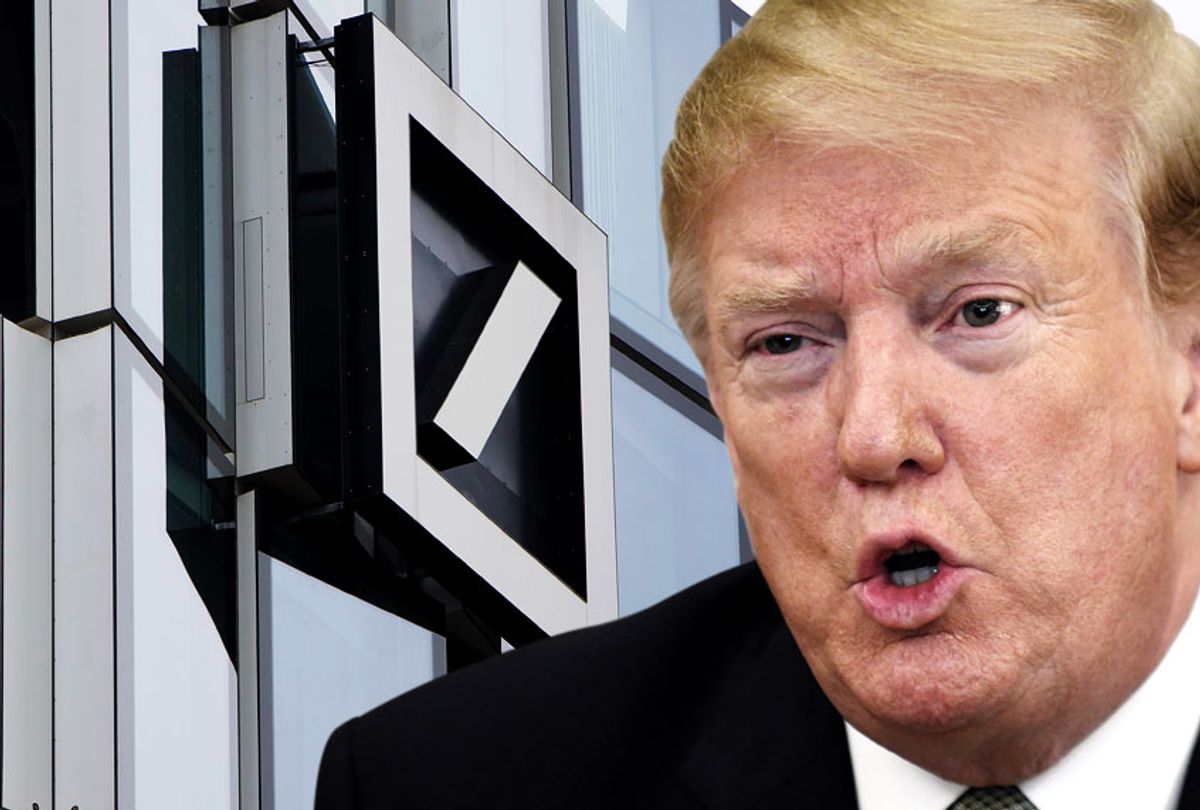President Donald Trump's relationship with Deutsche Bank, the German investment bank and financial services company, is receiving renewed attention thanks to a lengthy investigative report in The New York Times detailing its controversial activities.
Among the most important revelations in the Times story was that Deutsche Bank officials on separate occasions caught Trump inflating his personal wealth and the value of his assets. Prior to one business deal, bank employees determined that Trump was only worth $788 million despite initially valuing himself at $3 billion. On another occasion, Deutsche Bank officials found that Trump had inflated the value of some of his real estate holdings by as much as 70 percent.
Trump began his relationship with Deutsche Bank at a precarious time in his business career, when multiple defaults and high-profile failures had made him toxic to most of the world's premier financial lending institutions. The future president became so reliant on Deutsche Bank that he wound up taking out well over $2 billion in loans from the bank, which frequently touted its relationship with Trump in order to attract new customers.
Deutsche Bank loans funded various Trump-related projects, including renovations of his Art Deco tower at 40 Wall Street, which required a $125 million loan; a skyscraper to be constructed across from United Nations headquarters on the East Side of Manhattan, which involved a $300 million loan; and hundreds of millions of dollars for his Trump Marina casino in Atlantic City -- although that loan fell through after it was discovered that a credit officer's signature had been forged.
Deutsche Bank was also involved in Trump's effort to buy the General Motors building in Manhattan, and sold bonds on his behalf for Trump Hotels & Casino Resorts. On the latter occasion Trump promised a trip to Mar-a-Lago to Deutsche Bank salesmen who successfully unloaded the bonds, although he later apparently tried to renege on that promise. According to the Times article, he eventually relented and flew 15 salesmen to Florida on his Boeing 727 for a weekend of golf.
One of Deutsche Bank's more controversial investments was a decision to lend Trump $500 million for a 92-story Trump skyscraper in Chicago, with the future president personally guaranteeing $40 million in the event of a default. After the economy crashed in the autumn of 2008, Trump's lawyers claimed that an act of God had interfered, and he should not be required to repay the loan. (Well before that, he had struggled to sell off condominium units). Trump eventually sued Deutsche Bank for $3 billion based on "force majeure" language, in the contract, prompting bank executives to sever their ties with him. By 2010, the two parties had settled their differences and Trump agreed to repay most of what he owed the bank by 2012.
Intriguingly, after Trump won the 2016 presidential election, Deutsche Bank reportedly perceived its long relationship with the president-elect as a problem. Indeed, the bank commissioned reports to determine how it had become so entangled with Trump, and ordered its Wall Street employees not to publicly mention his name. The bank now faces investigations from at least two congressional committees and the New York attorney general.
The Times report continues:
Deutsche Bank officials have quietly argued to regulators, lawmakers and journalists that Mr. Trump was not a priority for the bank or its senior leaders and that the lending was the work of a single, obscure division. But interviews with more than 20 current and former Deutsche Bank executives and board members, most of them with direct knowledge of the Trump relationship, contradict the bank’s narrative.
Republican officials have continued to defend Trump even as the Deutsche Bank relationship enters the spotlight. Earlier this month Republican National Committee chair Ronna McDaniel lashed out at Department of Justice prosecutors in the Southern District of New York after it sent subpoenas to Deutsche Bank.
"The latest SDNY fishing expedition is another example of blue-state liberal prosecutors carrying out their vendetta against @realDonaldTrump," McDaniel wrote. "Let’s be clear: These are investigations in search of a crime – and their harassment has gone on for far too long."
As far back as 2017, it was revealed that special counsel Robert Mueller had issued a subpoena to look into the $300 million that the president supposedly owed Deutsche Bank before he was elected. Now it appears that Trump's relationship with the bank is much deeper and more complicated than that.



Shares